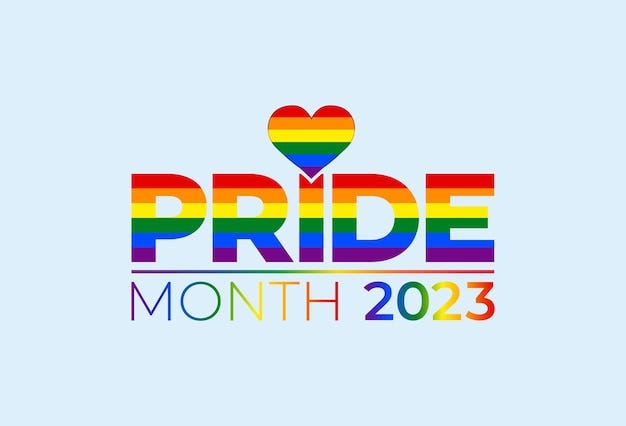Hey there, dear readers and friends,
This month I’m doing something that’s terrifying to me, something I feel wholly unqualified to do—I’m writing about Pride Month thanks to a conversation with one of my dearest friends who, in no uncertain terms, urged me to do this.
It’s not going to be perfect. Some parts might be messy. I am also opening myself up to hear feedback when I get it wrong. All I can say is that I’m showing up in this little circle of people to talk about my never-ending journey towards becoming an ally, thinking critically about anti-LGTBQ2IA+ narratives, and how deconstructing religious dogma allowed me to find Jesus standing with a rainbow flag. I know some folx here are under that flag; please pass these posts by if it’s bringing up too much for you. I’ll see you again in July <3
My intention is to speak to those people who are perhaps where I was 10 years ago with candor and empathy. It’s okay to have questions. It’s okay to not know (yet) how you can reconcile your Christian beliefs with an affirming stance. It’s okay to be afraid of what will happen when you begin pulling at these threads. I’m guessing that what you learned to be true is in direct opposition to this, or that you might have been told your doubt would show a lack of faith or even bring you punishment. If that’s where you’re at and you’d like to talk more about this, you can send me a direct message at ahradoway@gmail.com rather than leaving a comment, and we can chat there.
When I was 19, I started my journey as a follower of Jesus. I initially joined the Alliance church because I really had no idea what the difference was between any of them, and I was immediately welcomed and brought into their community. I grew so much as a person and really cherish the many memories I have of that time. However, there were some implicit beliefs that everyone just assumed everyone else believed—queerness being a sin, of course, being among them.
I had never been anti-LGTBQ2IA+ before that point in my life, and so I really tried to understand why the church considered it a sin. That lead me to mentally toss around some unkind, unloving assumptions that I won’t share here. Ultimately, my understanding of sin is that it’s something that hurts ourselves and others, and so I wondered if God didn’t want their children to be gay because of the pain that can exist in members of the community. It was easy for me to debate about other people’s lives at that time because it was really all just theoretical—it didn’t affect me or anyone I knew (at least, that’s what I thought).
The shift for me came from being in relationship with folx who are a part of the queer community. I recognize that it’s no small privilege that friends have entrusted their stories of trauma and pain to me, and that they’ve held space for my imperfections in this journey, of which I’m sure there are many. More than that, though, these relationships have shown me that queer people are flourishing when they are safe to live in the fullness of who they are, with the partners they love. It has been the joy of my life to be loved by these friends unconditionally, to have my family be loved by them, and to journey life’s path together—through challenges and joy and growth and pain—as equals. This challenged my previous notion, because these people are living more fully, more authentically, more lovingly as their queer selves. If being gay isn’t a sin, then why is there so much pain in the community?
“Much of the trauma that specifically affects LGBTQIA+ folks comes from a lack of acceptance and hostility toward these identities in society and politics.”
Trauma isn’t caused by being gay—it’s caused by people who are afraid or unwilling to think critically and challenge deep-seated beliefs.
Pride month matters.
Gay Straight Alliances in schools matter.
Safe, inclusive spaces matter.
Challenging beliefs in our churches and communities that are actively harming others matters.
When our communities are safer for queer folx, they become safer for everyone.








I realized my own queerness late because of so much internalized queerphobia. I didn't begin to unpack that until I had largely deconstructed all my religious and political beliefs.
It's still hard for me to reconcile that, and hard for me to give grace to those who haven't gotten to where I am, even though I know that what changed my mind is exactly what you described - relationship. Thank you for being a bridge.
Thank you Aleesha for writing and sharing this article, and for your honesty, openess and compasison. And for being an ally and witness to a more inclusive reading and rendering of the Chrisitan faith tradition. I have been an ally for a long time and am a minister in a tradition, the United Church of Christ, that has been open, affirming and inclusive for a long time. I am blessed to work alongside and journey with folkx across the identity spectrum. Being an ally to the LGBTQ2IA+ community and people has been one of the deepest blessings of my life. It is a humbling learning journey built on real relationships formed in love, kindness, compassion, honesty and open heart, mind and spirit. I would not be where or who I am without the grace and generosity of LGBTQ2IA+ friends, colleagues, teachers, mentors, students,, and activists who trusted, challenged and loved me.
Thank you for doing this during Pride month, and for being an ally. God bless you.